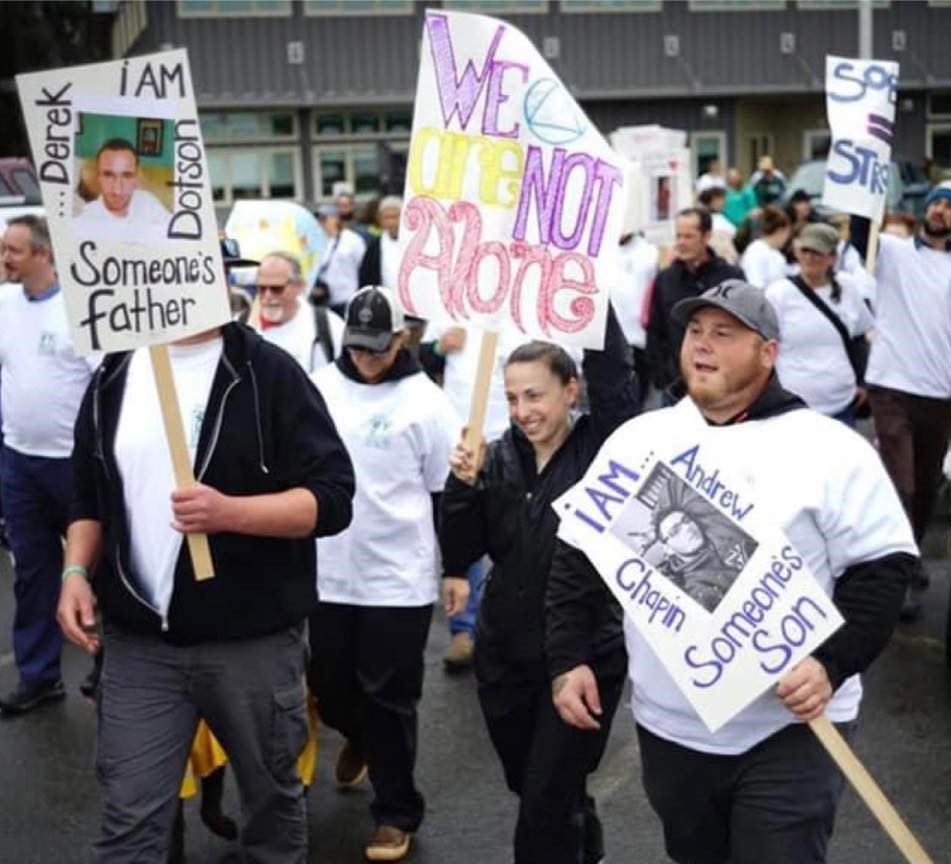
Ketchikan community participants during a previous Stomp the Stigma march. (Courtesy of Danielle Duckworth)
National Recovery Month is coming to a close at the end of September. Community members in Ketchikan recently gathered for the fourth annual Stomp the Stigma March and Resource Rally. It’s an effort to eradicate the shame that often surrounds addiction and other mental health issues – and show that help is available.
For Danielle Duckworth, a lifetime Ketchikan resident and organizer of Stomp the Stigma, addiction is personal. Duckworth has battled addiction herself, and she says the event is a celebration of the process of recovery.
The march itself is a mile-long parade where members of the community walk together, holding signs with the images of community members who have lost their lives to things like addiction and suicide. Duckworth says it’s an effort to show the true cost of mental illness.
“The intention all along was to have both the you know, kind of commemorating those people who we had lost and to put a face to it. Because, you know, we think about overdose or suicide or these numbers, but especially here in Ketchikan and us being a kind of a close knit community or a lot of people living here most of their lives– even if you weren’t really close to that person. You probably knew that person,” she said.
A 2020 health assessment by the nonprofit Ketchikan Wellness Coalition found that Ketchikan has more than three times as many alcohol induced deaths as well as double the amount of suicides as compared to the national average. The rate is even higher on Prince of Wales Island.
Scientists studying addiction say stigma is a very real barrier to treatment and recovery. And Duckworth says that stigma and shame take many forms. People battling addiction are often dehumanized by the public: stripped of their titles as mother, daughter, father, or son and instead labeled as a “drunk” or a “junkie.”
“The language is important because people think of an addict as just an addict or someone who chose to have this lifestyle. Whereas when you re-frame it into the substance abuse disorder,” Duckworth said, “it’s not something that you intended or wanted or thought would ever be an issue for you. It just is.”
And Duckworth says it’s important for community members to know that help is available. Over the years, the event has grown to include a “Resource Rally” showcasing the local organizations available to provide help.
“When you have a loved one who’s in the middle of it, and you feel like no they need help right now, like right now is when they’re ready. We’re not a big city. We don’t have the means to be able to have right now help. So knowing what the resources are that we have in Ketchikan and banding pieces of those all together is what it takes in our community to try to get help,” said Duckworth.
Duckworth acknowledges that Ketchikan does have its shortcomings when it comes to fighting addiction and mental illness – the Wellness Coalition’s assessment identified addiction treatment and rehab as the top community health need in Ketchikan. But Duckworth says it’s important to know there are resources available for those struggling with addiction and other mental illnesses.
“You know, while there’s a lot of help that we still need,” Duckworth said, “I think that trying to focus on some of the positive things that agencies are doing to try to meet those needs is important as well because it’s hard work to be in the middle of all of this.”
Duckworth says that for anyone looking into recovery, there are nightly 12-step meetings that are provided at 8 p.m. at 1736 Tongass Ave. The nonprofit Akeela also offers Ketchikan KAR House, an inpatient rehab facility. Anyone seeking aid would be provided the paperwork for a referral and a treatment plan that opens the door for the opportunity to confront their addictions.





